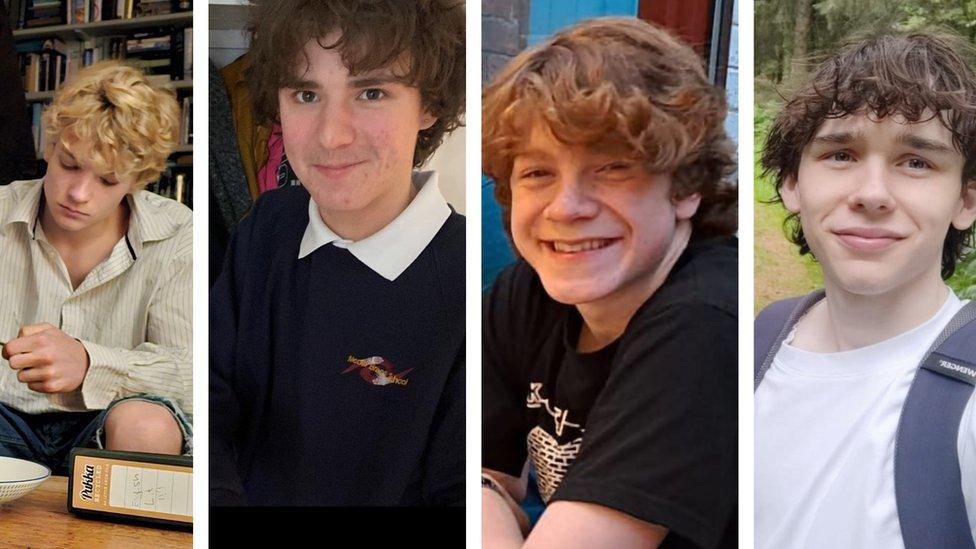Newspaper headlines: 'Camping weekend tragedy' and business tax cuts
- Published


Jevon Hirst, Harvey Owen, Wilf Henderson and Hugo Morris went missing over the weekend
The Daily Telegraph, external claims the chancellor will unveil the biggest business tax cut in half a century when he delivers his Autumn Statement on Wednesday. The paper describes the move as part of a "significant pivot" in the government's economic approach - with the focus moving from controlling price rises to jump-starting stuttering growth.
According to the Times, Jeremy Hunt will also cut National Insurance for 28 million people, external - after ministers became "markedly more upbeat" about the public finances in recent days.
The Guardian says the statement will contain 110 measures, external to try and boost the stagnant economy - but reductions in income tax "are thought more likely in the spring".
Writing in the Telegraph, the former Conservative leader, Lord Howard, external, argues Rishi Sunak's economic plan has been "vindicated". He says it was "absolutely necessary" to resist both unfunded tax cuts and large pay increases as part of efforts to counter high inflation - and the improving economy will now "provide some headroom" for the chancellor to begin to reduce the tax burden.
But the Daily Mirror, external says Rishi Sunak and Jeremy Hunt are engaged "in a desperate con that nobody will buy", "suddenly pretending to be a pair of Robin Hoods after playing sheriff of Nottingham to tax us at the highest rate in 70 years".
The vast majority of the front pages feature photographs of the four teenagers from Shropshire who died on a camping trip to north Wales. The Daily Mail suggests the sixth-form students, external may have lain undiscovered in their upturned car for 48 hours, after it came off a remote road and landed partially submerged in a ditch.
The Daily Express claims the friends, external "had little driving experience between them" and local residents have told the paper the weather was "atrocious" at the time they are thought to have crashed. "So Young", says the Sun's, external headline; "So Tragic", says the Daily Mirror., external
Tuesday's publication of a review - criticising elements of a police investigation into the disappearance of Nicola Bulley - has prompted the Sun, external to conclude that what it calls the "shambles" was a direct result of the Leveson Inquiry into the press. The paper says the inquiry "all but outlawed" private briefings to crime reporters - meaning the resulting information vacuum in Ms Bulley's case "was filled by malevolent online trolls and self-appointed sleuths".
The Mail, external agrees - arguing that chief constables "must take on board" the review's call for police and journalists to rebuild their fractured relationship. If police want to restore public confidence, it says, officers "must embrace the mainstream media rather than treat it as the enemy".
The results of a poll to find the most annoying words in popular culture are featured by the Mirror, external - which reports that "amazeballs", meaning something extremely good or impressive, topped the vote with 34%. Other words in the top 10 include "holibobs" (holidays), "bants" (banter) and "chrimbo" (Christmas).
A neuroscientist tells the Mail, external that if someone uses words we find embarrassing, we instinctively want to distance ourselves from them, as any awkward behaviour can trigger a threat response.

Sign up for our morning newsletter and get BBC News in your inbox.
